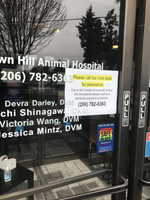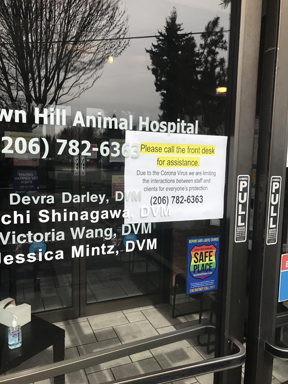
North Seattle Clinic Sign 288

VIN News Service photo
Some veterinary hospitals, such as this one in North Seattle, are asking pet owners to call rather than enter the building. Hospital staffers pick up pets in the parking lot and take them inside for exams. Veterinarians speak with the owners by phone to minimize person-to-person contacts, thereby reducing potential exposure to the novel coronavirus.
In asking businesses in his state to close for two weeks to help stunt the spread of COVID-19, Pennsylvania Gov. Tom Wolf on Monday included veterinary clinics among some 20 services and sectors that are deemed essential and should remain open.
Pennsylvania is rare in explicitly naming veterinary clinics. Most states that are taking aggressive measures to combat the epidemic have not provided guidance to veterinary practices, leaving veterinary teams to improvise as they attempt to provide continuity of care to their patients, at the same time trying to minimize their own exposure.
The American Veterinary Medical Association, in a message to its members Sunday, said it is "advocating for all veterinary hospitals and ambulatory practices to be considered essential businesses in any situations in which non-essential businesses are asked to close for COVID-19 risk mitigation. Veterinarians and our teams provide important animal and public health surveillance, deliver essential medical care for ill animals, and ensure that only healthy animals enter the food supply."
The organization followed up today with a statement elaborating on the role of veterinary practices as essential businesses and lauding Maryland, Pennsylvania and the city and county of San Francisco for recognizing them as such.
Asked whether being deemed "essential" precludes a practice from closing, the AVMA said no. "That is not to say that if a practice needs to close for reasons of protecting their staff members' health or other circumstances unique to that practice that they should be compelled to remain open," Dr. Rena Carlson-Lammers, chair of the AVMA Board of Directors, told the VIN News Service by email.
She added, "We do suggest that if they close, they work to identify an alternate service provider, if possible, and share that information with their clients."
In those jurisdictions that haven't addressed veterinary operations, state veterinary medical associations around the country are trying to clarify their governments' policies. But such questions aren't necessarily high on to-do lists in states straining to respond to the epidemic.
In Washington, where the first U.S. case of COVID-19 was diagnosed in January outside Seattle, and which has continued to be an epicenter of the disease, the role of veterinarians is not under consideration at this time, according to Hector Castro, a spokesperson for the state Department of Agriculture, the agency under which the state veterinarian operates.
If there were to be a decision regarding veterinary clinics, Castro said, "[I]t would draw on input from the state Department of Health, with direction from CDC [U.S. Centers for Disease Control and Prevention]," he told the VIN News Service.
Candace Joy, CEO of the Washington State Veterinary Medical Association, said by email: "It’s imperative that veterinary practices be considered essential services in the event of a lockdown. They’re not unlike any other medical professional and must be available to care for sick animals. In addition, veterinarians are on the forefront of protecting public health, especially now, considering that we’re still in the process of understanding the role of animals in COVID-19."
Pets have not been found to be part of the transmission chain to date. One sick person in Hong Kong is thought to have transmitted a low-level infection to her pet dog but authorities said the dog has no signs of illness related to COVID-19, and there is no evidence that the dog can pass along the disease.
In New York, which leads the country in numbers of confirmed cases of novel coronavirus — just over 1,700 as of today — Gov. Andrew Cuomo imposed tristate restrictions Sunday in cooperation with the governments of Connecticut and New Jersey, asking residents to work from home, and advising that only services and businesses that are "essential," remain open, including grocery stores, gas stations, pharmacies and medical facilities.
Asked whether veterinary medicine is considered essential in the state, Tom Atkinson, executive director of the New York State Veterinary Medical Society, responded by email today that the restrictions do not "prevent veterinary hospitals from providing emergency medical care for animals."
He went on: "All the state officials we are in contact with are extremely busy with issues that need resolving today. So we are respecting that and will seek clarification on this question if and when the need arises."
In California, which has the third-highest number of COVID-19 cases in the country — 698 as of today — the state veterinary medical association has been fielding many calls from members on the status of veterinary practices, said CVMA executive director Valerie Fenstermaker.
"While we believe veterinary practices provide essential services, we also know that there are city, county, state and federal mandates that are determining what businesses should stay open," Fenstermaker said by email. "We are advising members to use their best judgment based on the recommendation of their local public health authorities."
In the absence of definitive guidance from state officials, the Washington state VMA has put forth suggestions to its members such as limiting non-essential services, conducting car-side appointments, frequently cleaning the premises, ensuring all working staff are following protocols for keeping a distance, reviewing sick-leave policies with staffs and otherwise keeping staff members informed.
Along those lines, the AVMA suggests that veterinarians consider whether to defer some types of care. "Because of the need to conserve personal protective equipment [such as surgical masks, gowns and gloves], and within the context of professional judgment, veterinarians may wish to discuss with their clients whether it may be appropriate to postpone some elective surgical procedures while we manage our way through the COVID-19 crisis," Carlson-Lammers said.
Veterinarians posting on a message board of the Veterinary Information Network, an online community for the profession, asked for input and offered suggestions for staying safe while continuing to work. Advice included canceling all elective appointments, maintaining aggressive sanitation protocols and mailing prescription refills.
The biggest concern, however, was the heart of the practice: hands-on exams.
"Each hour, I find the news more distressing and am continuing to look for guidance to help my 2 practices (in Ontario) continue to operate but keep my staff safe and at ease," Dr. Janice Honda of Burlington, Ontario, wrote on Sunday. "We in our profession are experts in infection control — that is not my concern. With the latest recommendation of 'social distancing,' it can be hard in an exam room to do this."
Honda said she planned to have her veterinary technician hold animals during exams and to keep pet owners at a distance.
A growing number of practices and at least one teaching hospital are taking the further step of keeping pet owners out of their buildings entirely.
North Carolina State Veterinary Hospital is taking precautionary measures that allow only hospital personnel inside the hospital complex. Its website spells out the new intake process:
- Call your animal's designated service when you arrive at the parking lot.
- Please remain in your vehicle with your animal.
- A care professional will discuss your needs by phone when you arrive.
- At the end of the phone conversation, a care professional will come to the parking lot to bring your pet (animal) into the building for evaluation.
- After the medical team evaluates your animal, you will receive a phone call to discuss recommendations and a plan moving forward. Verbal consent for treatment and details surrounding financial estimates will be authorized via this phone call.
- Shortly thereafter you will receive a phone call from a customer service representative to obtain a deposit via one of our payment methods.
- Updates will be given regularly via phone by your medical team.
- Once the care of your animal is complete, the discharge process will be discussed.
Many practices have instituted versions of this approach, taping signs on clinic doors instructing pet owners to call before entering.
Even as many veterinarians scramble to devise ways of working safely through the crisis, some have seen their work dry up abruptly.
Dr. Melanie Bowden is one. As a relief veterinarian, Bowden fills in for veterinarians who are on vacation, sick leave, traveling for conferences and the like. As recently as Friday, Bowden said, her clients indicated that business was running as usual.
On Sunday, Dr. Anthony Fauci, director of the National Institute of Allergy and Infectious Diseases, said in an NBC television interview that Americans were "going to have to hunker down significantly more" to effectively fight COVID-19's spread.
It appeared many people took that seriously. On Monday, the clinic where Bowden was scheduled to work this week asked her not to come. "They said they had canceled all preventive cares that week, and prevent-care surgeries, and 'we just don't have the need for you,' " Bowden recounted.
She certainly understands. Her challenge is balancing her clients' needs and safety with the need to maintain her livelihood.
Based in Idaho, Bowden, 33, travels frequently through the Pacific Northwest, including in Seattle. "I realize I may represent a higher-risk person to bring into the practice," she said, referring to her likelihood of exposure and the possibility, as a younger person, of being asymptomatic but contagious.
At the same time, she cannot afford to absorb the full cost of last-minute cancellations. Her mortgage, student debt and other expenses still have to be paid. Ordinarily, she charges her full fee for cancellations made within 48 hours. Considering the extraordinary circumstances, Bowden said she charged 50%.
Now, while hunkered at a friend's place in Seattle, Bowden is contemplating how to balance keeping herself safe while continuing to make a living. If her next job, coming up in a couple of weeks, isn't canceled, should she even take it, considering some members of the veterinary team have a history of recent airline travel country? Will the owners, a married couple, really carry out their plan to vacation in Hawaii?
Bowden realizes there's no way to know yet. "We're literally going to take it one day at a time, stay in good communication with each other and try to do the best that we can for everyone," she said.